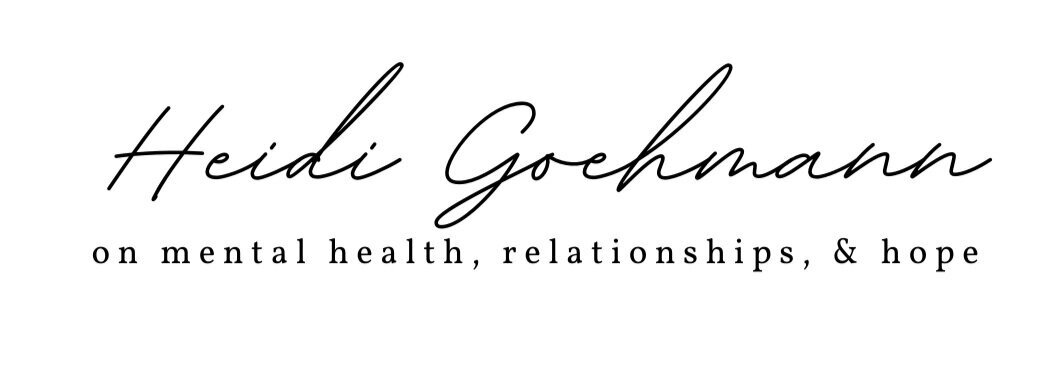The Many Sides of Mental Health: Microaggressions & Good Intentions
Fun fact: I am a woman.
I love being a woman. I do not want to be a man.
There are people who feel differently about all of that, and I am cool with complicated feelings. I am just not that person.
Here is, however, my problem:
I am also what people call a force.
I have words, a lot of them. I have opinions, even more of them. I am compassionate. I am kind. I am full of love and light. I am not gentle. I speak loud. I like chips and dip and big leather chairs and cigar smoke.
These are not, I have been told, ladylike things. I do not understand who decided these things, certain mindless distinctions between womanhood and manhood beyond what God designed. Now, sometimes my force creates messes. I am OK with being honest about the messes I make and the mistakes which lie in my wake. I own my stuff. When I am destructive, I want my closest friends, my sisters, my home team to call me on it. I want grace to come in and God to redeem those things too.
What I am over is the microaggressions. Those little verbal or non-verbal pokes and jabs that say, “You should really be different. You make me uncomfortable.”
Microaggressions toward women include: the small glance and head tilt in their direction for unsatisfactory behavior, the element of surprise that flits across someone’s face when a woman shares her professional credentials, as well as the constant need to share those credentials in order to be heard. The fact that the b-word was at some point attributed to human females and remains attributed to human females on a regular basis. I’m sure you have your own to add to this list.
Microaggressions toward racial minorities include: having to watch movies and tv shows everyday without seeing yourself reflected in any or very few of the actors, assumptions and generalizations of races, ethnicities, countries, and cultures, as well as being overlooked or underincluded in a conversation in favor of the white person standing next to you. There’s also the language we use, those little knives that cut so deep.
There are other groups of people and individuals targeted with microaggressions. Use an internet search engine and input “common groups affected by microaggressions.” The list might surprise you. While you are researching, google the impact of microaggressions on people’s health. These impacts are both physical and emotional. Microaggressions dig deeper into our psyche and our well-being than we generally care to admit in our culture.
This is the first duality or pair in our article series, “The Many Sides of Mental Health,” that includes two counter-productive concepts. Microaggressions are not good or helpful and they generally are paired with the idea of good intentions, which by definition may have the shadow of helpfulness, but at the end of the day are not good or productive.
Good intentions sound like:
“I didn’t mean to make her feel like that.” (An actual microaggression.)
“I’m not a racist, but…” (If you have to preface a statement, it’s best left unsaid.)
“Wow, there’s so much sexual harassment. They should do something about that.” (Yeah, WE should.)
Being part of the solution is to acknowledge being part of the problem.
I am a woman, who has said and done things to make myself feel stronger as a woman, at the expense of other woman. I am a white woman, who has said, done, ignored, and contributed to the hurt and injustice of others all around me. I have used the term “crazy.” I have failed to ask my friend, who happens to be gay, to dinner. I have looked past, looked through, and looked around people. My sin is mine — known and unknown. Do I have good intentions? Yes, and I believe most of us do. But we end up so concerned about people understanding our good intentions that we never deal with the root of the problem.
Microaggressions & good intentions tend to go hand-in-hand.
Fact: I have very little idea what it feels like to be a minority. So I won’t pretend to understand. I will ask what I can do to make it better. I am human. I will mess up. But I will apologize and I will own my stuff. I will also own the stuff of my community, those assumptions and hurts we have brought into humanity that shouldn’t have been there. Because we are all in this together.
Let’s start asking questions and scrap our good intentions.
If we ever want to reach anyone with the gigantic Gospel-sized love and concern and truth of Jesus Christ, we must enter the arena and lay down our good intentions in order to let real healing in, to expand hope and grace in the difficult places which leave people feeling unheard, less than, or excluded.
Jesus, confession, and grace lived out in real relationship break up this counterproductive pair. Microaggressions & good intentions: this is one of the many sides of mental health.
Up Next - The Many Sides of Mental Health: Apathy & Passion

